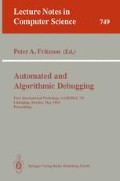Abstract
We present a novel and uniform technique for normal logic program declarative error diagnosis. We lay down the foundations on a general approach to diagnosis using logic programming, and bring out the close relationship between debugging and fault-finding.
Diagnostic debugging can be enacted by contradiction removal methods. It relies on a simple program transformation to provide a contradiction removal approach to debugging, based on revising the assumptions about predicates' correctness and completeness.
The contradiction removal method is justified in turn in terms of well-founded semantics. The loop detection properties of well-founded semantics will allow in the future for a declarative treatment of otherwise endless derivations. The debugging of programs under well-founded semantics with explict negation is also foreseen.
Here, we apply our techniques to finite SLDNF derivations, whose meaning coincides with the well-founded model, for which our contradiction removal method and algorithm is sound and complete. Several examples illustrate the algorithm at work.
We thank JNICT and Esprit BR project Compulog 2 (no 6810) for their support.
Preview
Unable to display preview. Download preview PDF.
References
M. R. Garey and D. S. Johnson. Computers and Intractability. Freeman and Co., 1979.
R. Greiner, B. A. Smith, and R. W. Wilkerson. A correction to the algorithm in reiter's theory of diagnosis. Artificial Intelligence, 41:79–88, 1989.
J. W. Lloyd. Foundations of Logic Programming. Symbolic Computation. Springer-Verlag, 1984.
J. W. Lloyd. Declarative error diagnosis. New Generation Computing, 5(2):133–154, 1987.
L. M. Pereira and J. J. Alferes. Well founded semantics for logic programs with explicit negation. In B. Neumann, editor, Proc. ECAI'92, pages 102–106. John Wiley & Sons, 1992.
L. M. Pereira, J. J. Alferes, and C. Damásio. The sidetracking principle applied to well founded semantics. In Proc. Simpósio Brasileiro de Inteligência Artificial SBIA '92, pages 229–242, 1992.
L. M. Pereira, J.N. Aparício, and J. J. Alferes. Derivation procedures for extended stable models. In Proc. IJCAI-91. Morgan Kaufmann, 1991.
L. M. Pereira, C. Damásio, and J. J. Alferes. Diagnosis and debugging as contradiction removal. In L. M. Pereira and A. Nerode, editors, 2nd Int. Ws. on Logic Programming and NonMonotonic Reasoning. MIT Press, 1993.
T. Przymusinski. Every logic program has a natural stratification and an iterated fixed point model. In 8th Symp. on Principles of Database Systems. ACM SIGACT-SIGMOD, 1989.
R. Reiter. A theory of diagnosis from first principles. Artificial Intelligence, 32:57–96, 1987.
A. Van Gelder, K. A. Ross, and J. S. Schlipf. The well-founded semantics for general logic programs. Jouranel of ACM, pages 221–230, 1990.
Author information
Authors and Affiliations
Editor information
Rights and permissions
Copyright information
© 1993 Springer-Verlag Berlin Heidelberg
About this paper
Cite this paper
Pereira, L.M., Damásio, C.V., Alferes, J.J. (1993). Debugging by diagnosing assumptions. In: Fritzson, P.A. (eds) Automated and Algorithmic Debugging. AADEBUG 1993. Lecture Notes in Computer Science, vol 749. Springer, Berlin, Heidelberg. https://doi.org/10.1007/BFb0019400
Download citation
DOI: https://doi.org/10.1007/BFb0019400
Published:
Publisher Name: Springer, Berlin, Heidelberg
Print ISBN: 978-3-540-57417-0
Online ISBN: 978-3-540-48141-6
eBook Packages: Springer Book Archive

